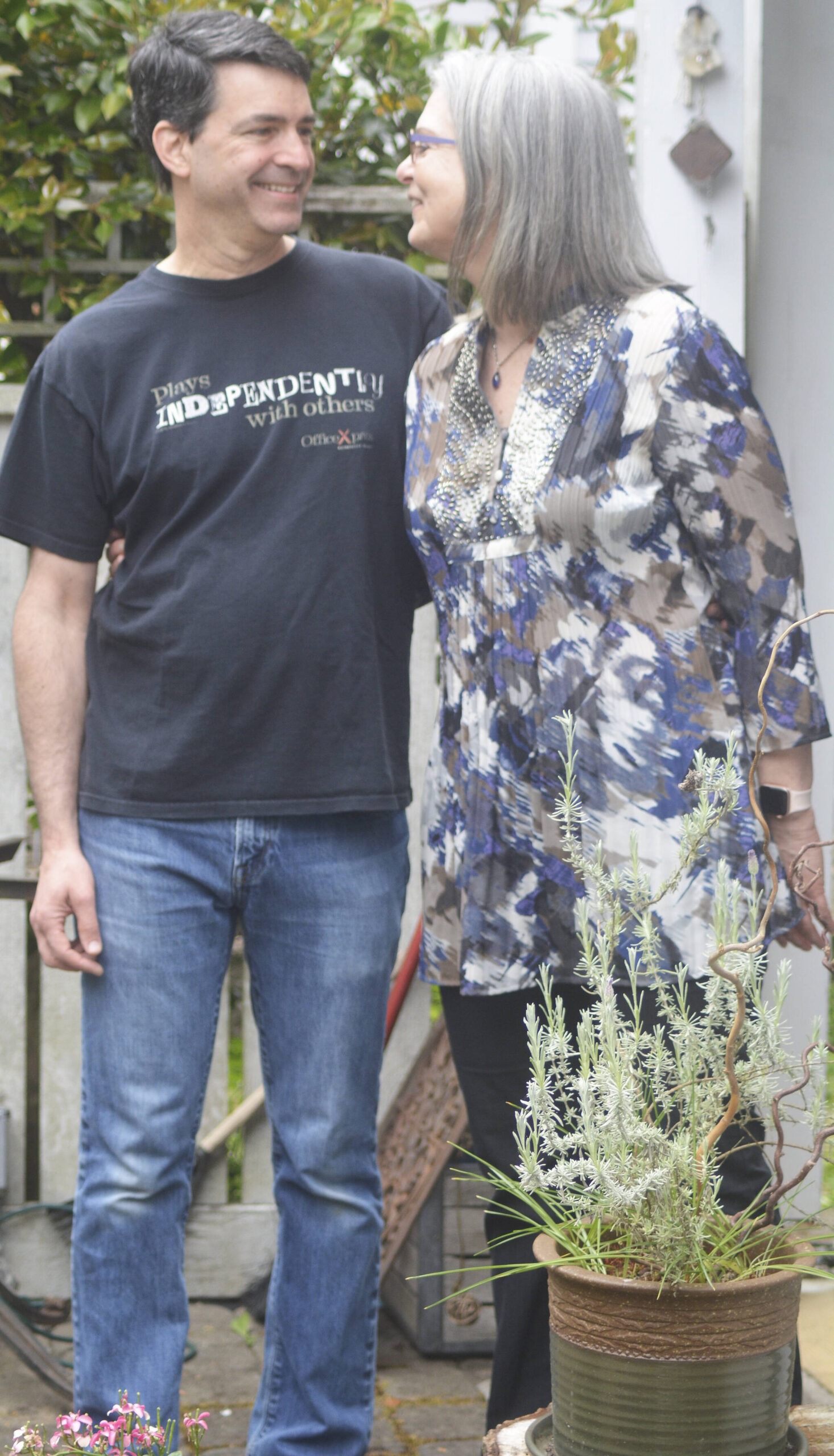Editor’s note: Bainbridge Island City Councilmembers talk a lot about climate change, but do they practice what they preach? You can decide as you read stories about six of them over the next month.
Leslie Schneider’s car is used so little the battery sometimes dies.
She buys most of her clothes at thrift stores. And she walks to work.
Those are just a few of the many things she does to lower her carbon footprint.
She and her partner of 16 years, Jason, live in a co-housing complex in Winslow. They moved there from the north end of Bainbridge Island eight years ago in part because they wanted to lessen their impact on the environment. They live in a compact house of 1,200 square feet that is heated with an environmentally friendly ductless heat pump. The cohousing community has a shared community room, guest room, laundry room and they even share garages that are used for storage. There’s even a “pre-Goodwill” spot where, “We can give and take before the final donation.”
Schneider said it’s the second-oldest co-housing development in the nation, established in 1992. Rather than buying a home they buy shares in all of the 30 homes on 5 acres. There’s an apple orchard, common garden and chicken hutch. A forested area with a trail is managed by the land trust so it can’t be developed.
She and Jason own OfficeXpats in the pavilion, about a seven-minute walk away and 10 minutes from City Hall. “It’s a good day when I can pick a fig on the way to work,” she said.
Their car, a 10-year-old Ford hybrid, gets 38 miles per gallon, although they’re looking for a plug-in vehicle. They’d like a road trip vehicle, but those in their price range don’t have the battery range they want.
They have double-paned windows and put shades on the outside of the west-facing windows to minimize afternoon summer heat. They got rid of a propane stove and bought an energy-efficient electric induction stove and convection oven.
The co-housing community manages a compost system, so they don’t send food scraps to a landfill.
They have two electric bikes, two traditional bikes and one electric scooter. “We like biking to Lynwood Center or down to Manitou Beach and up to Rolling Bay,” she said. “I look forward to better bike infrastructure to both places in coming years.”
They think of the environment even when going to the big city. “We like renting scooters in Seattle to get us to our Sunday opera matinees at Seattle Center.”
And even when they travel by plane, they do what they can to offset that by buying credits on Sustainable Transportation International.
She admits she falls short with food. “One area I am not carbon-careful enough about: I eat chicken and fish, and very rarely, beef or lamb. I do not eat pork; it’s my compromise with vegetarianism, and pork is ubiquitous! I expect to eat less meat in my future,” she said.
As to how she got into this lifestyle, she said, “There’s nothing more important.”
She was influenced a lot by her parents. Growing up in Spain outside of Barcelona she would attend school in the morning, and her mom would teach her in afternoons. But her dad made the major difference when he wrote a book. He was a city planner but he didn’t like the way things were done. “Cities should be built for the people,” Schneider said was her dad’s philosophy. “If you build for cars it’s not good for people. He chose people over cars.”
By 1992 she was all about car sharing like what was being done in Germany and sustainability and “building a better world.” She volunteered with Sustainable Seattle. Even as conscientious as Schneider is about climate change, she admits it can be hard at times. “It’s hard to live in U.S. society without a car,” she said.
Jason added, “It’s so consumer-focused.”
He grew up in Los Angeles so he enjoyed the seclusion when he moved to north BI. He would take a bus to the ferry for work in Seattle, where he met Schneider. She was living in co-housing in Seattle at the time.
Along with her personal life, Schneider likes that the City Council also tries to lead by example. Fairly recently it got its first electric car. But she does get frustrated by how slowly things happen in government. Like the city switching to electric hand tools in the maintenance department. That took over a year. The city did pass one law quickly regarding business use of plastics in town. Even though the council ended up scaling back that decision Schneider said she didn’t consider that a bad decision. “If we hadn’t had passed it,” we wouldn’t have found out what still needed to be done, she said.



